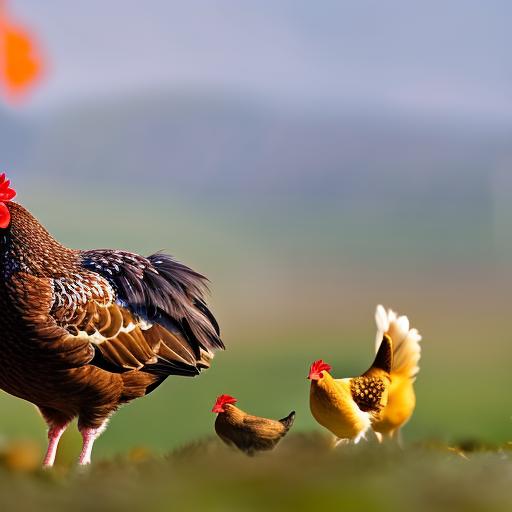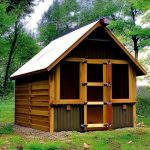Keeping free-range chickens safe is of utmost importance for any chicken owner. Free-range chickens have the freedom to roam and forage, which provides them with numerous benefits such as access to fresh air, sunlight, and a diverse diet. However, with this freedom comes the risk of various threats that can harm or even kill the chickens. This is where a secure chicken coop plays a crucial role. A well-designed and properly maintained chicken coop provides shelter and protection for free-range chickens, ensuring their safety and well-being.
Key Takeaways
- Free-range chickens need to be kept safe from various threats to ensure their health and well-being.
- Factors that threaten the safety of free-range chickens include predators, harsh weather conditions, and diseases.
- A chicken coop plays a crucial role in keeping free-range chickens safe by providing shelter, protection, and a clean environment.
- When choosing a chicken coop for your free-range chickens, consider factors such as size, materials, and design.
- Building a safe and secure chicken coop requires careful planning, attention to detail, and regular maintenance.
The importance of keeping free-range chickens safe
Free-range chickens offer several advantages over confined chickens. They have the opportunity to engage in natural behaviors such as scratching, pecking, and dust bathing. They also have access to a wider range of food sources, including insects, worms, and plants. This diverse diet leads to healthier chickens and higher quality eggs.
In addition to the health benefits, free-range chickens also contribute to sustainable farming practices. They help control pests naturally by eating insects and weeds, reducing the need for chemical pesticides. They also produce nutrient-rich manure that can be used as fertilizer for gardens or crops.
However, keeping free-range chickens safe is essential to ensure they can continue to enjoy these benefits. Without proper protection, they are vulnerable to predators, harsh weather conditions, and diseases.
Factors that threaten the safety of free-range chickens
1. Predators: Free-range chickens are at risk of being attacked by predators such as foxes, raccoons, coyotes, dogs, and birds of prey. These predators see chickens as easy prey and can cause significant damage to a flock if not kept at bay.
2. Weather: Extreme weather conditions can pose a threat to free-range chickens. Cold temperatures can lead to frostbite or hypothermia, while excessive heat can cause heat stress or even death. Heavy rain or snow can also make it difficult for chickens to find shelter and can lead to health issues.
3. Disease: Free-range chickens are exposed to a wider range of pathogens compared to confined chickens. They can contract diseases from wild birds, rodents, or other animals they come into contact with. Common diseases that can affect free-range chickens include avian influenza, Newcastle disease, and coccidiosis.
The role of a chicken coop in keeping free-range chickens safe
A chicken coop serves as a safe haven for free-range chickens. It provides them with shelter from predators, protection from harsh weather conditions, and a secure place to rest and lay eggs. A well-designed chicken coop also helps in disease prevention by minimizing contact with potential carriers of pathogens.
A chicken coop should have sturdy walls and a secure roof to keep predators out. It should also have proper ventilation to ensure good air circulation and prevent the buildup of moisture, which can lead to respiratory problems. The coop should be spacious enough to accommodate the number of chickens you have and should have nesting boxes for them to lay eggs.
Choosing the right chicken coop for your free-range chickens
When choosing a chicken coop for your free-range chickens, there are several factors to consider:
1. Size: The size of the chicken coop should be appropriate for the number of chickens you have. Each chicken should have enough space to move around comfortably and access the nesting boxes without overcrowding.
2. Materials: The materials used in the construction of the chicken coop should be durable and predator-proof. Common materials include wood, metal, or plastic. Make sure the materials are non-toxic and easy to clean.
3. Design: The design of the chicken coop should be practical and functional. It should have easy access for cleaning and egg collection. Consider features such as windows for natural light, ramps or stairs for easy access, and a secure door or gate.
Tips for building a safe and secure chicken coop

If you decide to build your own chicken coop, here are some tips to ensure it is safe and secure for your free-range chickens:
1. Choose a suitable location: The chicken coop should be placed on level ground and away from areas prone to flooding. It should also be situated in an area with good drainage to prevent water buildup.
2. Use sturdy materials: Use high-quality materials that can withstand the elements and deter predators. Reinforce vulnerable areas such as doors and windows with hardware cloth or wire mesh to prevent entry.
3. Provide proper ventilation: Install vents or windows to ensure good air circulation inside the coop. This helps prevent respiratory issues and keeps the coop dry.
4. Install predator-proof fencing: Surround the chicken coop with a sturdy fence that extends underground to prevent predators from digging under it. Use wire mesh with small openings to prevent predators from squeezing through.
5. Include a secure door or gate: The door or gate of the chicken coop should be strong and lockable to keep predators out at night. Consider using a predator-proof latch or lock.
Maintaining a clean and healthy chicken coop environment
A clean and healthy chicken coop environment is essential for the well-being of free-range chickens. Regular cleaning helps prevent the buildup of bacteria, parasites, and diseases. Here are some tips for maintaining a clean chicken coop:
1. Regularly remove droppings: Clean out droppings from the coop at least once a week. This helps prevent the spread of diseases and keeps the coop smelling fresh.
2. Provide clean bedding: Replace soiled bedding regularly to maintain a clean and dry environment for the chickens. Common bedding materials include straw, wood shavings, or sand.
3. Clean waterers and feeders: Clean waterers and feeders regularly to prevent the growth of bacteria or mold. Provide fresh water daily and ensure feeders are filled with clean, nutritious food.
4. Inspect for signs of pests: Regularly inspect the coop for signs of pests such as mites, lice, or rodents. Take appropriate measures to control and eliminate these pests if necessary.
Providing adequate food and water for free-range chickens
Free-range chickens have the opportunity to forage for their own food, but it is still important to provide them with supplemental feed and clean water. Here are some tips for providing adequate food and water for free-range chickens:
1. Offer a balanced diet: Provide a balanced diet that includes a combination of commercial chicken feed, kitchen scraps, and foraged food. Commercial feed ensures they receive all the necessary nutrients, while kitchen scraps and foraged food add variety to their diet.
2. Provide clean water: Ensure chickens have access to clean, fresh water at all times. Clean and refill waterers regularly to prevent the growth of bacteria or algae.
3. Use feeders and waterers designed for chickens: Use feeders and waterers specifically designed for chickens to prevent contamination and spillage. These can be hung or placed at an appropriate height to discourage pests from accessing them.
Protecting free-range chickens from predators
Predators pose a significant threat to free-range chickens, but there are measures you can take to protect them:
1. Install fencing: Surround the free-range area with a sturdy fence that is buried at least 12 inches underground to prevent predators from digging under it. Use wire mesh with small openings to prevent predators from squeezing through.
2. Use deterrents: Install motion-activated lights or sprinklers near the chicken coop to deter predators. You can also use noise-making devices such as wind chimes or radios to scare away potential threats.
3. Secure the coop at night: Close and lock the chicken coop at night to keep predators out. Make sure all windows, doors, and vents are secure.
4. Use guardian animals: Consider using guardian animals such as dogs or geese to help protect the free-range chickens. These animals can act as a deterrent and alert you to potential threats.
Happy and healthy free-range chickens with a secure chicken coop
Keeping free-range chickens safe is essential for their well-being and the benefits they provide. A secure chicken coop plays a vital role in protecting them from predators, harsh weather conditions, and diseases. By choosing the right chicken coop, building it with safety in mind, maintaining a clean environment, providing adequate food and water, and implementing predator protection measures, you can ensure your free-range chickens are happy and healthy. With a secure chicken coop, you can enjoy the benefits of free-range chickens while keeping them safe from harm.
If you’re looking for the best way to keep your free-range chickens safe, you might want to consider investing in the Producers Pride Sentinel Chicken Coop. This innovative coop is designed to provide maximum security and protection for your chickens while still allowing them the freedom to roam and forage. With its sturdy construction and predator-proof features, such as secure latches and reinforced wire mesh, the Sentinel Chicken Coop ensures that your feathered friends are safe from any potential threats. To learn more about this top-notch coop and other ideas for large chicken coops, check out this informative article on Poultry Wizard: https://poultrywizard.com/keeping-chickens/large-chicken-coop-ideas/.
FAQs
What is free range chicken?
Free range chicken refers to chickens that are allowed to roam freely outdoors, rather than being confined to a small space or cage.
What are the benefits of keeping free range chickens?
Free range chickens have access to fresh air, sunlight, and a variety of natural foods, which can lead to healthier and more flavorful eggs and meat. They also have more space to move around and exhibit natural behaviors, which can improve their overall welfare.
What are the risks of keeping free range chickens?
Free range chickens are more vulnerable to predators, such as foxes, raccoons, and birds of prey. They may also be more susceptible to diseases and parasites if they come into contact with wild birds or other animals.
What are some ways to keep free range chickens safe?
Some ways to keep free range chickens safe include providing secure fencing or netting around their outdoor area, using motion-activated lights or alarms to deter predators, and providing a secure coop for them to roost in at night. It is also important to regularly monitor the chickens for signs of illness or injury.
What should I feed my free range chickens?
Free range chickens will forage for much of their food, but it is important to supplement their diet with a balanced feed that provides all the necessary nutrients. This can include a mix of grains, seeds, and protein sources such as soybean meal or fish meal. It is also important to provide access to clean water at all times.
Meet Walter, the feathered-friend fanatic of Florida! Nestled in the sunshine state, Walter struts through life with his feathered companions, clucking his way to happiness. With a coop that’s fancier than a five-star hotel, he’s the Don Juan of the chicken world. When he’s not teaching his hens to do the cha-cha, you’ll find him in a heated debate with his prized rooster, Sir Clucks-a-Lot. Walter’s poultry passion is no yolk; he’s the sunny-side-up guy you never knew you needed in your flock of friends!







